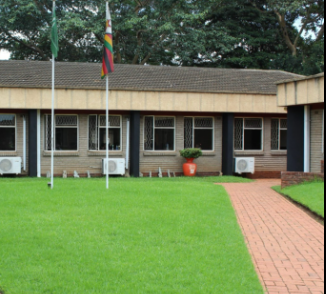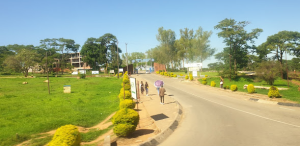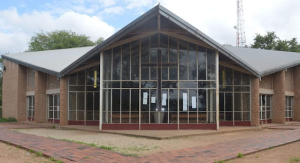The Essentials
Type of Institution: College
Fees per Course: US$120.00 to US$400.00
Address: C3 Civic Centre, Rotten Row, Harare, Zimbabwe
Phone Number: +263 242 749076/7
Executive Director: Rachel Chigwanda
Number of students:400+
Website: https://zcm.co.zw/
Email: registry@zcm.co.zw
Table Of Contents
- Overview
- Contact Details
- Address
- Location
- School Fees
- Courses & Programs
- Vacancies and Entry Requirements
- Logo
- Notable Alumni
- Pros and Cons
- Author’s Review
Overview
The Zimbabwe College of Music is a prestigious institution dedicated to the education and promotion of music in Zimbabwe. Established in 1948, it has played a significant role in nurturing musical talent and preserving the rich musical heritage of the country.
History and Background
The Zimbabwe College of Music was founded to provide formal music education in Zimbabwe and has since evolved into a key institution for musical training in the region. Over the decades, it has become a hub for musicians, composers, and educators, contributing to the development of Zimbabwe’s music industry.
Departments and Specializations
The Zimbabwe College of Music provides training in a wide range of musical disciplines, including:
Classical Music: Focuses on Western classical music, including theory, history, and performance.
Ethnomusicology: Concentrates on the study and preservation of African music traditions.
Jazz Studies: Covers jazz theory, history, and performance techniques.
Popular Music: Explores contemporary music genres, including rock, pop, and hip-hop.
Traditional African Instruments: Instruction in traditional Zimbabwean instruments like the mbira, marimba, and ngoma.
Facilities and Resources
The college is equipped with facilities that support a rich learning environment, including:
Practice Rooms: Spaces equipped with instruments for individual and group practice.
Recording Studios: Professional-grade studios for sound recording and production.
Performance Halls: Venues for recitals, concerts, and other performances.
Library: A comprehensive collection of music scores, books, and recordings.
Extracurricular Activities
Students at the Zimbabwe College of Music can participate in various extracurricular activities, such as:
Choirs and Ensembles: Opportunities to perform in groups, enhancing teamwork and performance skills.
Concerts and Recitals: Regular events where students can showcase their talents.
Cultural Exchanges: Programs that connect students with other music institutions worldwide.
Community Engagement and Outreach
The college is deeply involved in community outreach programs, offering music education to underprivileged communities and working to preserve and promote Zimbabwean musical traditions.
Career Opportunities
Graduates from the Zimbabwe College of Music pursue careers as performers, composers, music teachers, ethnomusicologists, sound engineers, and more. The college’s focus on both theoretical and practical aspects of music ensures that students are well-prepared for the music industry.
Admission Requirements
Certificate and Diploma Programs: Generally require a basic understanding of music and proficiency in at least one instrument.
Bachelor’s Degree: Requires A-Level qualifications or equivalent, with a strong background in music.
Location
The Zimbabwe College of Music is located in Harare, making it accessible to students from across the country. Its central location also allows for interaction with the vibrant music scene in the capital city.
Zimbabwe College of Music Contact Details
You can contact Zimbabwe College of Music via their landline, email or you can visit their website for further contact details.
Phone Number: +263 242 749076/7
Website: https://zcm.co.zw/
Email: registry@zcm.co.zw
Zimbabwe College of Music Address
C3 Civic Centre, Rotten Row, Harare, Zimbabwe
Zimbabwe College of Music Location
Zimbabwe College of Music is situated in the largest city in Zimbabwe, called Harare on C3 Civic Centre and Rotten Row.
Zimbabwe College of Music Fees
Zimbabwe College of Music fees is currently ranging from US$120.00 to US$400.00 per course or program depending on the duration of the course. Please contact the institution or visit them to get the latest fees structure as it can change at any term or semester.
Zimbabwe College of Music Courses & Programs
The Zimbabwe College of Music offers a diverse range of courses and programs designed to cater to different levels of musical proficiency and interest.
Certificate Programs
Certificate in Music Theory and Practice
Certificate in Ethnomusicology
Certificate in Jazz Studies
Certificate in Sound Engineering
Certificate in Popular Music
Certificate in African Traditional Music
Certificate in Instrumental Performance (e.g., Piano, Guitar, Drums, Mbira)
Diploma Programs
Diploma in Music Education
Diploma in Music Performance
Diploma in Ethnomusicology
Diploma in Jazz and Popular Music
Diploma in Music Technology and Sound Engineering
Diploma in African Music
Bachelor’s Degree Programs
Bachelor of Music (BMus)
Bachelor of Arts in Ethnomusicology (offered in collaboration with the University of Zimbabwe)
Bachelor of Music in Jazz Studies
Bachelor of Music in African Music and Dance
Short Courses and Workshops
Sound Engineering Workshops
Music Production Courses
Introduction to Music Theory
Instrumental Training (e.g., Mbira, Marimba, Guitar, Piano, Voice)
Vocal Coaching and Choir Direction
Music Business and Entrepreneurship
Special Programs
Children’s Music Program: Introduction to music for young children, focusing on basic musical concepts and instrument familiarization.
Community Music Projects: Outreach programs designed to bring music education to underprivileged communities.
Summer Music Camps: Intensive music training programs offered during the summer for students of all levels.
Instrument-Specific Courses
Piano Performance
Guitar Studies
Drumming and Percussion
Mbira and Marimba
Brass and Woodwind Instruments
Vocal Training and Choir Singing
Research and Ethnomusicology
Research in Zimbabwean Traditional Music
Studies in African Musical Instruments
Fieldwork in Ethnomusicology
Zimbabwe College of Music Vacancies and Entry Requirements
The Zimbabwe College of Music offers a variety of programs and courses, each with specific entry requirements.
Certificate Programs
Vacancies: Open to beginners and those seeking to improve their foundational music skills.
Entry Requirements:
Basic Requirements: A minimum of 5 O-Level passes, including English Language.
Music Proficiency: Some programs may require basic proficiency in an instrument or music theory.
Duration: Typically 1 to 2 years.
Diploma Programs
Vacancies: Available for students with some background in music who wish to advance their skills.
Entry Requirements:
O-Level Requirements: At least 5 O-Level passes, including English Language.
Additional Requirements: A relevant Certificate in Music or equivalent qualifications. Applicants may also be required to pass an audition or entrance exam.
Duration: Typically 2 to 3 years.
Bachelor’s Degree Programs
Vacancies: For students aiming for comprehensive and advanced musical training.
Entry Requirements:
A-Level Requirements: A minimum of 2 A-Level passes, with a strong background in music. Some programs may require specific subjects, such as English or Art.
Music Proficiency: Demonstrated proficiency in music theory, performance, or composition. Applicants may be required to pass an entrance exam or audition.
Additional Considerations: Relevant diplomas or equivalent qualifications may be considered for mature entry or credit transfer.
Duration: Typically 3 to 4 years.
Short Courses and Workshops
Vacancies: Open throughout the year, catering to individuals seeking specific skills or professional development.
Entry Requirements:
General Public: Open to anyone with an interest in music, with no formal academic requirements.
Specialized Courses: May require basic knowledge or experience in a specific area, such as sound engineering or instrumental performance.
Duration: Ranges from a few weeks to several months.
Special Programs
Children’s Music Program:
Vacancies: Open to children aged 5 and above.
Entry Requirements: No formal requirements; the program is designed to introduce children to music.
Community Music Projects:
Vacancies: Open to participants from various communities, with a focus on those with limited access to formal music education.
Entry Requirements: Open to all interested individuals, regardless of prior musical knowledge.
Application Process
Application Form: Prospective students must complete an application form, available from the college’s admissions office or website.
Supporting Documents: Submission of certified copies of academic certificates, identification documents, and any other required materials.
Auditions/Entrance Exams: For some programs, particularly those at the diploma and degree levels, applicants may be required to pass an audition or entrance exam to demonstrate their musical abilities.
Deadlines: Applications should be submitted before the specified deadlines for each intake period, usually several months before the start of the academic year.
Special Considerations
Mature Entry: Applicants over a certain age (usually 25 and above) who do not meet the standard entry requirements may be considered based on their experience in the music field or other relevant qualifications.
Recognition of Prior Learning (RPL): The College may recognize prior work experience, informal education, or non-accredited courses as part of the entry requirements.
Zimbabwe College of Music Logo
Below is the logo of Zimbabwe College of Music with excellent quality and it is available to download in PNG (transparent file) JPEG and PDF.
Notable Alumni
*Charles Charamba
*Charles Chipanga
*Clive Mukundu
*Dudu Manhenga
*Dumi Ngulube
*Dumisani Maraire
*Gary Tight
*Hope Masike
*James Chimombe
*King Tazvida
*Louis Mhlanga
*Maffcat
*Maria Wilson
*Manuel Bagorro
*Prince Musarurwa
*Prudence Katomeni
*Tendai Chimombe
*Victor Kunonga
Zimbabwe College of Music Pros and Cons
Pros
Comprehensive Music Education: The College offers a wide range of programs, from certificate to degree levels, covering various music genres and disciplines, including classical, jazz, ethnomusicology, and African traditional music.
Focus on African Music: The college is one of the few institutions in the region that emphasizes the study and preservation of African music, offering unique courses in ethnomusicology and traditional instruments like the mbira and marimba.
Experienced Faculty: The college boasts a faculty of experienced musicians, composers, and educators who provide high-quality instruction and mentorship to students.
Performance Opportunities: Students have numerous opportunities to perform in concerts, recitals, and ensembles, helping them gain valuable stage experience and build confidence.
State-of-the-Art Facilities: The college is equipped with modern facilities, including recording studios, practice rooms, and performance halls, which enhance the learning experience.
Cultural Exchange and Collaboration: The college often collaborates with international institutions and participates in cultural exchange programs, providing students with exposure to global music trends and practices.
Community Engagement: The college is deeply involved in community outreach, offering music education to underprivileged communities and organizing events that promote Zimbabwean musical heritage.
Location: Being located in Harare, the capital city, students have access to a vibrant music scene and various cultural events, enriching their overall educational experience.
Cons
Limited Course Diversity: While the college offers a broad range of music-related programs, it may not provide as many options for those interested in more niche areas of music or contemporary popular genres outside of African and classical traditions.
Resource Constraints: Like many institutions in Zimbabwe, the college may face challenges related to funding and resources, which could impact the availability of materials, instruments, and technology for students.
Competitive Admission: Due to its reputation and the quality of education offered, admission into some programs can be competitive, particularly for degree programs that require auditions and high academic standards.
Focus on Traditional and Classical Music: While the emphasis on African traditional music is a strength, students who are more interested in modern, global music trends might find the curriculum less aligned with their interests.
Cost of Education: Tuition fees and the cost of living in Harare may be a barrier for some students, particularly those from low-income backgrounds.
Limited Career Services: The college may have limited resources dedicated to career placement and industry connections compared to larger, more resource-rich institutions.
Potential for Overcrowding: As a popular institution, some classes or practice rooms may become overcrowded, potentially limiting individual attention from instructors and access to facilities.
Infrastructure Challenges: Zimbabwe’s economic situation can sometimes affect the maintenance and upgrading of college infrastructure, which may impact the overall learning environment.
Author’s Review
The Zimbabwe College of Music stands out as a premier institution dedicated to nurturing and developing musical talent. With its specialized programs in music performance, composition, theory, and music education, the college offers students a focused and rigorous education in the arts.
The experienced faculty, comprehensive curriculum, and state-of-the-art facilities provide an enriching environment for students to hone their musical skills and pursue their artistic passions.
However, prospective students should weigh some potential challenges, such as the limited range of non-music programs and potential financial costs. Additionally, while the college excels in music education, it may not offer the same breadth of academic and extracurricular opportunities found in larger, more general institutions.
Overall, the Zimbabwe College of Music is an excellent choice for individuals committed to a career in music, offering a supportive and specialized environment to develop their craft.
Its strong focus on music and the arts, combined with a dedicated faculty and modern facilities, make it a standout institution for aspiring musicians. Prospective students should consider their dedication to music and readiness for a focused academic environment when evaluating this unique educational opportunity.



